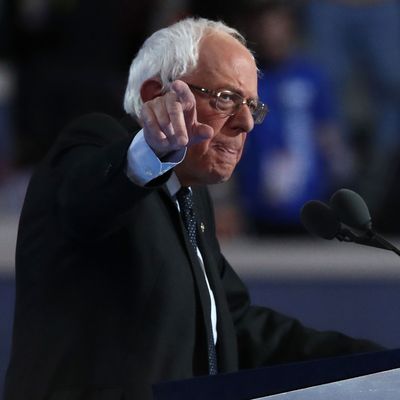
Suppose you didn’t know about the Bernie-or-Bust bros chanting “Lock Her Up” on the streets of Philadelphia Monday morning, or some of his delegates booing him Monday afternoon for calling Hillary Clinton’s election as president urgent and mandatory. Imagine you didn’t know the chattering classes were buzzing all day about the terrible disunity that seemed to be breaking out, and the threat of terrible disturbances on the floor.
If all you paid attention to was the evening speeches, the first night of the convention was a cavalcade of progressive voices (with a few interruptions) making the case for like-minded voters to unite behind Hillary Clinton — concluding, of course, with Bernie Sanders. Comedian Sarah Silverman was the only Sanders supporter who came right out and told off the Bernie-or-Bust minority that had basically terrorized the convention at its beginning. But marginalizing these people was the residual effect of the evening. In a way, the Sanders campaign (and its ideological fellow-travelers like Elizabeth Warren) may have even helped Clinton triangulate against the angry left, without her having to lift a finger or raise her own voice — or calling on her own allies to get their hands dirty.
Would that have happened without the early unpleasantness? I don’t know. But there was a sense of catharsis when the tension of Oh my God, they’re going to boo Bernie! broke that probably broke the resistance to Clinton once and for all.
It does appear that Clinton’s people had to make the concession of going along with a full roll-call vote in which Sanders will get his votes, but that won’t happen in front of an audience as large as tonight’s. And yes, the network folks did conduct an intensive search after Bernie’s speech to find a handful of delegates who are still holding out against the unity demands (one complained that Bernie was consigned to a speech at 10:30 p.m., apparently not realizing that’s super-prime-time).
But you get the sense that the fever has broken. It actually broke when Michelle Obama spoke and made delegates forget their differences. And the effort to compare the disunity on display in Philadelphia with that in Cleveland founders on two basic differences: (1) Sanders and his allies were endorsing their nominee, not urging that their supporters “vote their consciences” like Ted Cruz, and (2) all the angry howling in Cleveland was emanating from the voices of the winners, not the marginalized fringe of the losers. That makes a lot of difference in how the two conventions feel.






























